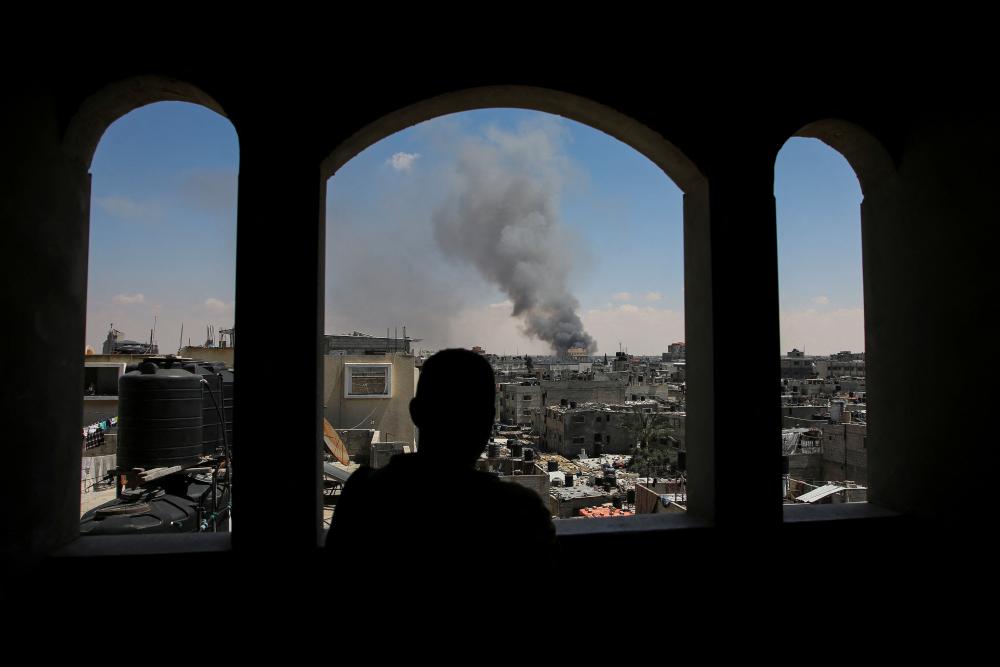When Israeli troops paraded through the Rafah crossing with an oversized star of David on Tuesday morning, they were making a point to Hamas – and at the same time driving up to the very edge of Joe Biden’s “red line”.
The Biden administration avoids that phrase at all costs. Its top officials also served Barack Obama, who drew a red line he did not enforce over Syria’s chemical weapons. But there is no hiding from the fact that they have clearly and repeatedly stated US opposition to a Rafah offensive, absent proper humanitarian provision for the more than 1 million people sheltering there.
Related: Israeli airstrike that killed seven health workers in Lebanon used US munition, analysis reveals
Such provisions are still clearly lacking and there is general consensus among the US government, UN agencies and humanitarian NGOs that a Rafah offensive would create a humanitarian disaster, even by the dire standards already set in Gaza.
So there is no question an Israeli thrust into Rafah city itself would mark blatant defiance of the Biden administration, and US officials admit the coming days will be consequential for US-Israeli relations, to say the least.
While watching Israel’s next move in Rafah, the state department is also due on Wednesday to deliver a formal assessment to Congress, under a national security memorandum Biden signed in February (NSM-20), assessing whether the Israel Defense Forces (IDF) are conducting its campaign in accordance with humanitarian law – in other words, whether the IDF is committing war crimes.
It is a moment of truth for Biden’s policy on Israel and the Palestinians, or at the very least a moment when continued prevarication becomes much harder to disguise.
There is still a little remaining leeway. State department officials have signalled that the NSM-20 report might not be delivered on time on Wednesday, but could slip a day or two. As for Rafah, the taking of the crossing is arguably distinct from an attack on the city itself, and could be seen as the sort of targeted action the US recommended in place of an all-out offensive. So there is still time perhaps before Biden’s bluff is called.
US officials say they genuinely cannot assess whether the long-brandished threat of a Rafah offensive is designed to get better ceasefire terms from Hamas, or whether Israeli participation in the ceasefire talks is a mere smokescreen for its military preparations. Both can be true, they argue, suggesting that Netanyahu himself may be playing it by ear and has yet to decide himself. If it is decision time for the US president, it is also crunch time for the Israeli prime minister.
Netanyahu cannot make the decision alone. He has insisted that critical decisions about the war are made by his three-man war cabinet, sharing responsibility and blame. He is also constrained by the hard-right members of his wider security cabinet, who have threatened to bring down his coalition if he makes peace with Hamas and forgoes a Rafah assault. That could end his political career and leave him to face serious corruption charges unprotected.
Red lines applied to the US-Israel relationship have a habit of turning pink
Aaron David Miller, senior fellow, Carnegie Endowment for International Peace
Given that he is caught in a vise, Netanyahu might choose to press against the US side of that vise, which has shown it has more give in it.
“Red lines applied to the US-Israel relationship have a habit of turning pink,” Aaron David Miller, a former US negotiator on the Middle East and now a senior fellow at the Carnegie Endowment for International Peace, observed.
Netanyahu is well aware that all the tools Biden has at his disposal are double edged. Restricting arms supplies would be a shock for Israel, but would also strip Biden of his leverage to boost humanitarian supplies into Gaza and achieve a ceasefire, while at the same time extract a significant political cost in an US election year.
“Biden is in a strategic cul de sac,” Miller said, arguing that a hostages–for-ceasefire deal is the only way out.
In the absence of such a deal, Israel is likely to move on Rafah city, forcing Biden to choose between a historic rift with Israel, or humiliating acquiescence in potential war crimes. In both those scenarios, his Middle East policy would be rendered bankrupt, and bankruptcy comes in two ways, as Ernest Hemingway famously noted: “Gradually, then suddenly.”
